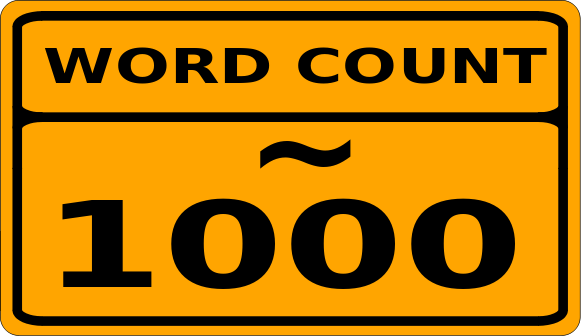Many students see meeting the page count or word count as the goal of writing a paper. They have to churn out 1,000 words or 10 pages to meet some standard that isn’t made clear to them. As a result, they turn in badly written, hurriedly written, rapidly typed, non-proofread pages full of words. They may not make a lot of sense, but hey, they’ve met the word count! Then the grade comes, and the disappointed student asks why they got such a low grade. After all, they met the word count, didn’t they?
Meanwhile, the teacher or professor doesn’t realize that their shorthand of X words or Y pages is not a shorthand to the students. The instructor knows that in order to get enough coverage of the content, it’s going to take about X pages or Y words. But they’ve been doing this gig for so long that it doesn’t occur to them that the students see the number of pages or words as the goal of a paper assignment, rather than the real goal – communicating an idea or getting a point across. Then they’re perplexed and annoyed when they receive the badly written, scrambled papers that their panicky students produce.
When I tell my students, “you are only allowed 8 pages to say everything you need to say about this topic,” it’s like flipping on a light switch. All around the room, worried frowns shift to puzzled expressions, and then relieved smiles. It’s a very different take on how paper writing works. When I shift my students off of the word or page requirement, and frame it as “you have only 8 pages to say everything you need to say,” it often helps the student as they reexamine what they want to do with a paper. By shifting them away from how many pages they have to write, and focusing instead on how little space they are allowed to use in order to say what they want to say, I give my students a new way of looking at the assignment, which focuses them on the content of the paper rather than the form.
As a result, they get better results. They write crazily and then pare down their words to clarity and concision. They check to see if they’re filling up space that they need to make some other points, and edit out the redundancies and the repetition. They eschew the longer $12 word for the shorter, more pointed synonym. And as a result, their papers improve dramatically.
If you are a student struggling with a paper because it has to be fifteen double-spaced pages long, try reframing it this way: I only have fifteen double-spaced pages. In those pages, I have to say everything I need to say about this topic. How am I going to do that? See if it doesn’t change the way you feel about the paper. It might help you approach it more logically and more carefully – and if you can do that, you’re already on the way to a better score on that paper.
You May Also Be Interested In…
What Kind of Paper Does Your Professor Want?
The ACE Method for Choosing a Paper Topic
Making Citations Easy
The Too-Many-Ideas Problem
Three Things To Know About Research

